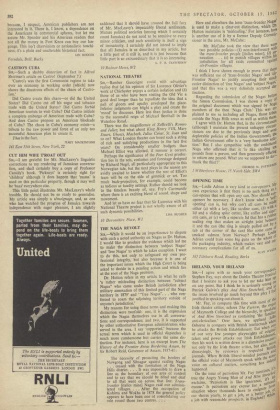Sm,—While it would be an impertinence to dispute with such
a noted authority on Nagas as Dr. Hutton, I would like to produce the evidence which led me to make the distinction between 'subject Nagas' and 'free Nagas' to which he takes exception. I want to do this, not only to safeguard my own pro- fessional integrity, but also because it is one of the important issues which the High Court is being asked to decide in a pending action and which lies at the root of the Naga problem.
Dr. Hutton refers in my article to what he calls 'a rather misleading distinction between "subject Nagas" who came under British jurisdiction after military annexation of this limited part of the Naga territory in 1879' and "free Nagas". . . who con- tinued to roam the adjoining territory outside of anyone's jurisdiction.'
My reasons for using these terms and making this distinction were twofold: one, it is the expression which the Nagas themselves use in all conversa- tions and correspondence; and two, it is supported by other authoritative European administrators who served in the area. I say 'supported,' because the actual term which is used in official dispatches is much more cumbersome but carries the same dis- tinction. For instance, here is an excerpt from The History of the Frontier Areas Bordering Assam, by Sir Robert Reid, Governor of Assam, 1937-41: The necessity of protecting the borders of Nowgong and Sibsagar against raiding Nagas . . . ceased with the formation of the Naga Hills district. . . . It was impossible to draw a line as the boundary of our area of control and to say that we should be blind and deaf to all that went on across that line. Trans- frontier [italics mine] Nagas raid our adminis- tered villages. . . . After the occupation of Kohima and Wokha in 1878 the general policy appears to have been one of consolidating our rule round those two centres.: , . Here and elsewhere the term 'trans-frontier Nagas' is used to make a clear-cut distinction, which Dr. Hutton maintains is 'misleading.' For instance, here is another use of it by a former Deputy Commis. sioner in the area, Mr. McCabe:
Mr. McCabe took the view that there wen
two possible policies—(1) non-interference will' the trans-frontier people [italics mine]; (2) at!' nexation . . . (c) to punish villages within 1s, jurisdiction for all raids committed against cis-Frontier villages.
I think I have shown enough to prove that there
was sufficient use of 'trans-frontier Nagas' and 'cis• Frontier Nagas' to justify accepting their mueb, easier distinction of 'free Nagas' and 'subject Naga!, and that this was a very definitely accepted dn. tinction.
Regarding the submission of the Nagas before
the Simon Commission, I was shown a copY of the original document which was signed by Naga members of the then 'Naga Club.' This was ..e/g2 plained to me as including all Nagas, those tribes outside the Naga Hills areas as well as within than' I agree with Dr. Hutton that, in the circumstances (although I maintain the present unhappy circnul. stances are due to the previously inept and ev,,_e° deplorable policies of the Indian Government), the Indian Government offer is a 'very handsome scull, lion.' But I also sympathise with the embittered Naga who affirmed that it 'is like stealing ten pounds from a person, and then generously offerOlS to return one pound. What are we supposed to (10-- thank the thief?' GEORGE N. PATTERs°14














































 Previous page
Previous page